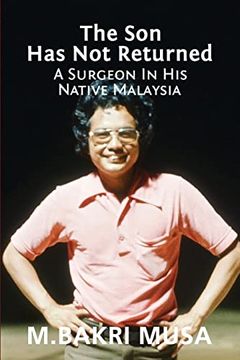Reseña del libro "The Son Has Not Returned: A Surgeon In His Native Malaysia (en Inglés)"
The Son Has Not Returned: A Surgeon in His Native Malaysia is a memoir of a Malaysian-born and Canadian-trained surgeon's tenure in his native Malaysia from January 1976 to May 1978, and at a time when the term "brain drain" had not yet entered the popular lexicon.When he left Canada to return home, it was to be a permanent move. Alas, that was only intention; other factors soon intruded. Policymakers may expound on the dynamics of the brain drain, but in the end what makes an individual leave his country of birth is unique unto himself. To adapt Tolstoy's line, families who stay put are all the same; those who emigrate do so for their own special reasons.This is one such story. The writer is blessed to have been spared dramatic escapes from tyrant rulers, encounters with natural calamities, or surviving meaningless wars. Instead, the "push factors" chronicled here are the cumulative effects of rigid bureaucracies, obstinate civil servants, and widespread incompetence. Those are at least potentially remediable. More problematic is the pernicious culture of deteriorating institutions, endemic corruption, and entrenched feudalism masked by a veneer of pseudo modernity. The deterioration of institutions ranged from the physical ones, as with operating rooms shuttered for months because of contamination to inept management that resulted in droves of physicians leaving the service and country. The corruption ranges from shenanigans in the hospital's kitchen that resulted in patients having only watery soup to relatives of the dead having to pay 'tolls' to claim the remains of their loved ones. The entrenched feudalism led to a dedicated senior colleague being banished out of state within 24 hours for having unintentionally transgressed some feudal rituals. During the thirteen years the writer was away training to be a surgeon, both Malaysian and the writer had changed, but in opposite directions. Parting ways early spared him many dashed hopes, unpleasant emotions, and bitter recollections. As such the memories recalled here are for the most part fond, sweet and pleasureable. This is a recollection of small and not-so-small events that in their totality make some other place in this blessed God's planet more attractive to bring up his family and pursue his career than the land where he was born and raised.For those inclined to use the constraints of family, culture, geography, or anything else as reasons for not pursuing their dreams, the writer reminds them of the Koranic verse. "When the angels take the souls of those who wronged themselves, [the angels] say, 'In what state were you?' They say, 'We were weak and oppressed.' [The angels] would reply, 'Was not God's earth vast enough that you might have migrated elsewhere?'" (Surah An-Nisa 4:97)Bakri Musa was far from being weak or oppressed while in Malaysia and the land was neither barren nor chaotic, but Allah's universe elsewhere was far more promising.The title is a line from Sitor Situmorang's poem, "Si Anak Hilang" (The Lost Son). The writer's first memoir, Cast From The Herd: Memories of a Matriarchal Malaysia, recalls his growing up in the world's largest matrilineal society, the Minangkabau.

